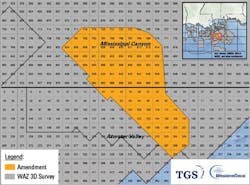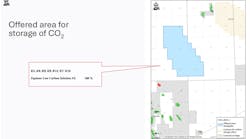Schlumberger, TGS to increase data coverage in the central Gulf of Mexico
TGS and Schlumberger have announced a new multi-client nodal seismic project in the US Gulf of Mexico. The project, named “Amendment,” will comprise acquisition of a 2,350-sq km (907-sq mi) multi-client seismic survey in the Mississippi Canyon and Atwater Valley protraction areas. This area includes open acreage, existing producing assets, and new discoveries.
Seismic data will be acquired using Fairfield Geotechnologies 4C nodal acquisition technology with operations expected to start in 4Q 2018. The companies will apply their full azimuth processing expertise and expect to deliver final data to customers in 1Q 2020.
The Amendment project will comprise acquisition of a 2,350-sq km (907-sq mi) multi-client seismic survey in the Mississippi Canyon and Atwater Valley protraction areas. (Map courtesy TGS)
Maurice Nessim, president, WesternGeco, Schlumberger, added: “Schlumberger and TGS have built up extensive geophysical and geological knowledge in this prolific part of the US Gulf of Mexico. In line with the WesternGeco asset-light strategy, the application of nodal seismic technology and state-of-the-art imaging techniques will help to accelerate hydrocarbon discovery, development, and production for our clients.
“This unique dataset will provide a step change in illuminating complex subsurface structures and help E&P companies to maximize the value of their producing assets and rejuvenate their exploration portfolios. This highly integrated project will combine well log data, high-quality orthogonal WAZ and new nodal measurements to provide foundations for the first industry-funded regional nodal survey in the deepwater Gulf of Mexico.”
This survey is supported by industry prefunding.
Norway, Russia sanction partial cross-border Barents Sea seismic studies
Russia and Norway have signed an agreement on mutual rights to acquire seismic in the Barents Sea. This is a follow-up to the signing of the Delimitation Agreement in September 2010.
According to Kjell-Børge Freiberg, the Norwegian Minister of Petroleum and Energy, it will allow both countries to map the resource potential up to, and along the maritime delimitation line in the Barents Sea.
Currently they are each mapping resources on their respective side of this line. Under the new accord seismic vessels from both countries will also be allowed to cross the delimitation line and use their seismic equipment within 5 km (3.1 mi) of the continental shelf of the other party.
This should allow both sides to acquire good quality seismic up to, and along the delimitation line, which could be important should an oil and gas discovery extend across the border. The 2010 agreement states that any such discoveries will be subject to unitization.
Two Shearwater vessels win 3D seismic work
Shearwater GeoServices has won contracts to acquire 3D seismic surveys in the Mediterranean Sea and offshore Southeast Asia, both due to start soon.
The Polar Empress will perform the Mediterranean survey, covering 1,300 sq km (502 sq mi), over a two-month period.
The Polar Duchess will acquire more than 8,000 sq km (3,089 sq mi) for two separate Southeast Asia programs, lasting five months in total. •




